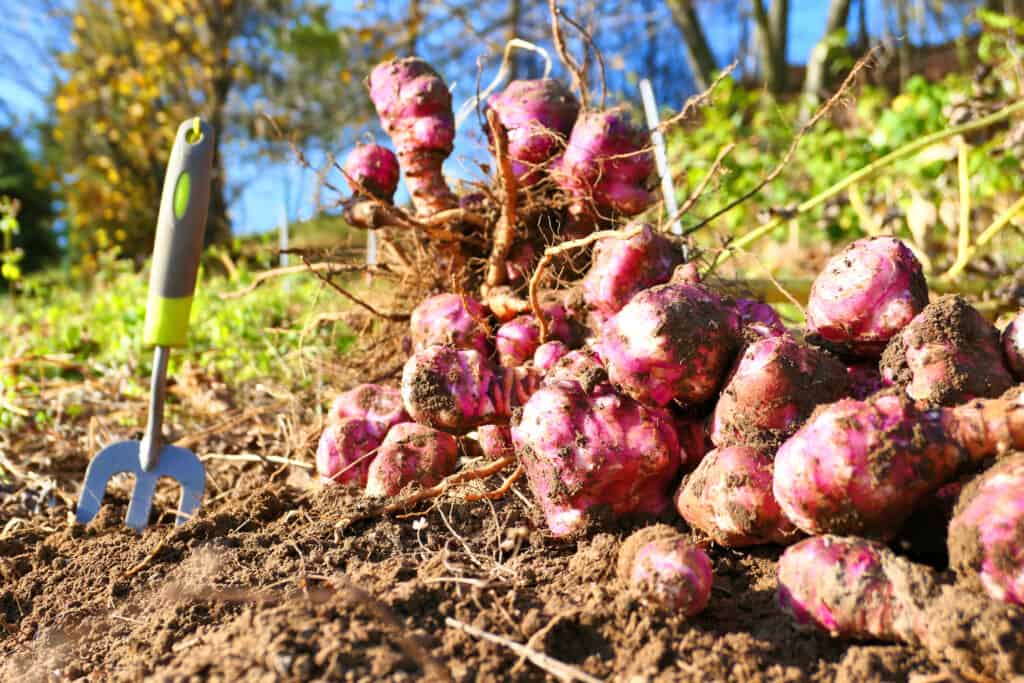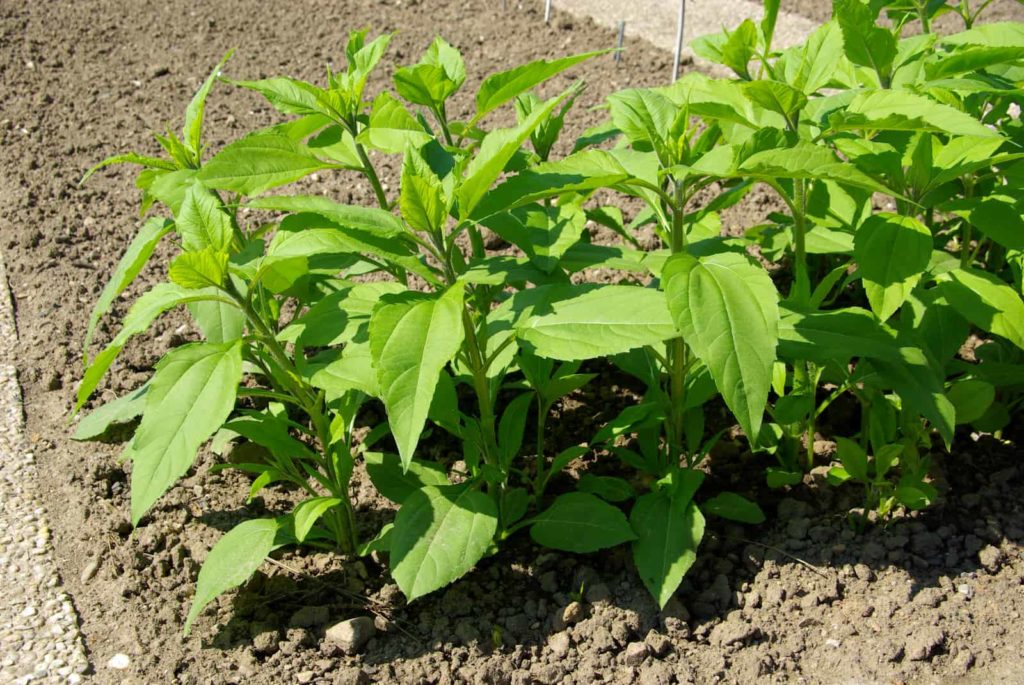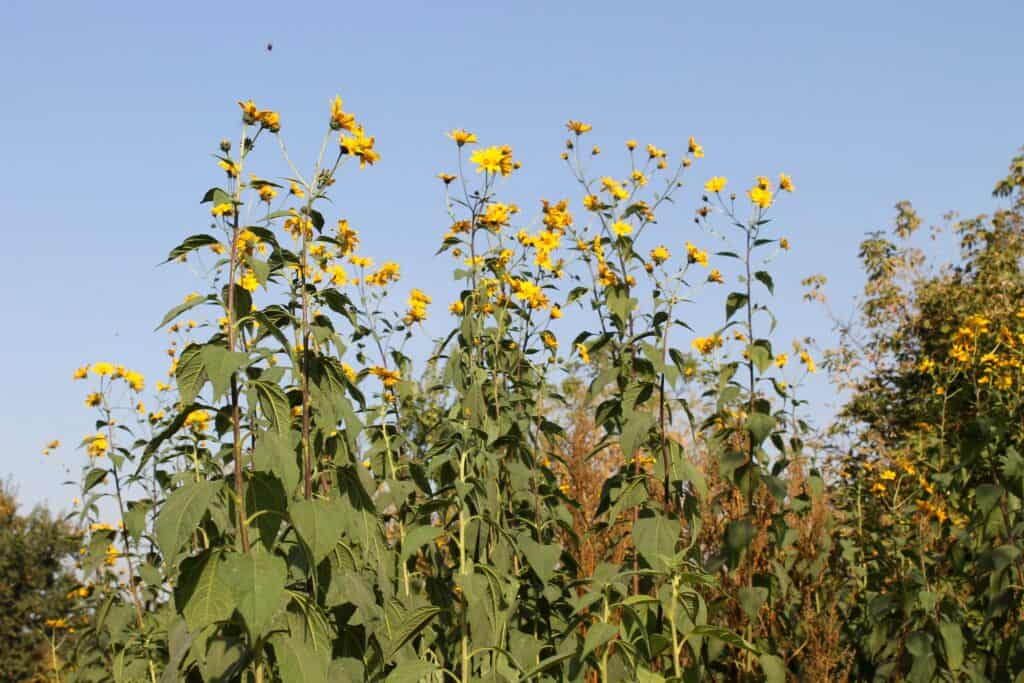The sunchoke, also called Jerusalem artichoke, is a variety of perennial sunflowers grown for its edible low-starch tuber which looks much like a small potato but tastes like a water chestnut.
The sunchoke is a hardy perennial that grows from 5 to 10 feet tall. The plant has rough-textured leaves 4 to 8 inches (10-20cm) long and is topped with small yellow flowers 2 to 3 inches (5-7cm) across.
Related articles:
- Five Ways to Cook and Serve Jerusalem Artichoke
- Jerusalem Artichoke Plant Starting Tips
- How to Harvest and Store Jerusalem Artichoke
- How to Plant and Grow Jerusalem Artichoke

The name Jerusalem artichoke is a misnomer: the plant is not related to the artichoke, though the sunchoke’s flavor may be reminiscent of the artichoke. The plant is not from Jerusalem: the name is probably derived from the Italian name for sunflower, girasole, which means turning to the sun.
Here is your complete guide to growing Jerusalem artichokes–sunchokes.
Jerusalem artichoke quick planting tips
- Jerusalem artichoke tubers can be planted in the garden as early as 2 to 3 weeks before the average last frost date in spring.
- They are best planted in soil that has warmed to 50°F (10°C).
- In warm-winter regions, sunchokes can be planted in winter. Sunchokes require 110 to 150 days to reach harvest.
- Yield: Plant 5 to 10 sunchokes for each household member.
Tools for Vegetable Gardeners at Amazon:
- A.M. Leonard Straight Rake with Ash Handle
- All-Steel Nursery Spade with D-Grip Handle
- 4-Tine Spading Digging Fork with D-Handle
- Digital Soil pH Meter Outdoors Greenhouse
- Earthwise Handheld Electric Fertilizer Spreader

Where to plant Jerusalem artichoke
- Plant Jerusalem artichoke in full sun.
- The Jerusalem artichoke prefers loose, well-drained soil but will grow almost anywhere. Add aged compost or sand to planting beds before planting; loose soil will make tuber harvesting easier.
- The Jerusalem artichoke prefers a soil pH of 5.8 to 6.2.
- It is best to plant Jerusalem artichokes in a dedicated bed; once established they will spread rapidly and may require some effort to remove. Tuber spread can be controlled by root barriers.
- The Jerusalem artichoke grows tall; it can be planted densely to form a screen or windbreak.
- Jerusalem artichokes will survive a hard freeze if protected by a layer of soil or mulch.
Jerusalem artichoke planting time
- Jerusalem artichoke tubers can be planted in the garden as early as 2 to 3 weeks before the average last frost date in spring.
- Jerusalem artichokes are best planted in soil that has warmed to 50°F (10°C).
- Jerusalem artichokes grow best in temperatures ranging from 65° to 90°F (18-32°C).
- In warm-winter regions, sunchokes can be planted in winter.
- Jerusalem artichokes require 110 to 150 days to reach harvest.
More at Jerusalem Artichoke Plant Starting Tips.
Planting and spacing Jerusalem artichokes
- Plant Jerusalem artichoke tubers 2 to 6 inches (5-15cm) deep, 12 to 18 inches (30-45cm) apart.
- Space rows 36 inches (91cm) apart.
Container growing Jerusalem artichokes
- Jerusalem artichokes can be grown in containers but will quickly fill a small container.
- Choose a container at least 18 inches across for one plant.
Jerusalem artichoke companion plants
- Grow Jerusalem artichoke with corn, rhubarb, and peanuts.
- Avoid planting Jerusalem artichoke with tomatoes.

Watering and feeding Jerusalem artichokes
- Jerusalem artichokes grow best with an even, regular supply of water but can survive long periods of drought once established.
- Jerusalem artichokes require no extra feeding; they grow best in soil rich in organic matter.
Caring for Jerusalem artichokes
- Jerusalem artichoke tubers grow, divide, and easily spread. To contain sunchokes install wood, plastic, metal, or masonry barriers at least 24 inches (61cm) deep in the soil.
- Avoid deep cultivation near Jerusalem artichokes; they are shallow-rooted and spread to 18 inches (45cm) away from the main stem.
Jerusalem artichoke pests and diseases
- Aphids may attack Jerusalem artichokes. Pinch out infested foliage or hose the aphids off the plants.
- Jerusalem artichoke tubers can rot in wet soil but are generally disease-free. Plant in well-drained soil and quickly remove diseased plants.
Harvesting Jerusalem artichokes
- Jerusalem artichoke tubers will be ready for harvest is 120 to 150 days after planting.
- Jerusalem artichokes are ready for harvest when leaves die back; lift tubers with a spading fork.
- Cut off flower stalks as soon as they appear to encourage tuber development, not seed, production.
- Plants also can be “lodged” once flowers appear; step on stems at soil level and bend them to the side diverting energy to the tubers.
- Jerusalem artichokes harvested after a light frost will be sweeter tasting.
- Tubers left in the ground will regrow the following season.
More at How to Harvest and Store Jerusalem Artichokes.
Storing and preserving Jerusalem artichoke
- Jerusalem artichokes will keep in the refrigerator for 7 to 10 days.
- Set Jerusalem artichokes in a cold moist place and they will keep for 2 to 5 months.
- Sunchokes can be frozen or left in the ground until needed; protect over-wintered sunchokes with a layer of mulch.
Jerusalem artichoke varieties to grow
- ‘Stampede’.
About Jerusalem artichoke
- Common name. Jerusalem artichoke, sunchoke
- Botanical name. Helianthus tuberosus
- Family: Asteraceae
- Origin. North America
Related articles:
How to Plant and Grow Jerusalem Artichokes – Sunchokes
Jerusalem Artichoke – Sunchoke Plant Starting Tips
How to Harvest and Store Jerusalem Artichokes – Sunchokes
Five Ways to Cook and Serve Jerusalem Artichokes – Sunchokes
Garden Planning Books at Amazon:
- Vegetable Garden Almanac & Planner
- Kitchen Garden Grower’s Guide Vegetable Encyclopedia
- Vegetable Garden Grower’s Guide
- Tomato Grower’s Answer Book
More how to grow articles:
Learn how to plant, grow, and harvest your favorite vegetables. Click below for all you need to know.
- Artichoke
- Arugula
- Asparagus
- Beans, Snap
- Beets
- Broad Beans
- Broccoli
- Brussels Sprouts
- Cabbage
- Cantaloupe — Melons
- Cardoon
- Carrots
- Cauliflower
- Celeriac
- Celery
- Chard
- Chayote Squash
- Chickpeas
- Chicory
- Chinese Cabbage
- Collards
- Corn Salad
- Corn, Sweet
- Cresses
- Cucumbers
- Eggplant
- Endive and Escarole
- Fava Beans
- Florence Fennel
- Garbanzo Beans
- Garlic
- Horseradish
- Jerusalem Artichoke
- Kale
- Kohlrabi
- Leeks
- Lettuce
- Lima Beans
- Melons
- Mizuna
- Mustard Greens
- New Zealand Spinach
- Okra
- Onions
- Parsnips
- Peanuts
- Peas
- Peppers
- Potatoes
- Pumpkins
- Radicchio
- Radishes
- Rhubarb
- Rutabaga
- Salsify
- Shallots
- Sorrel
- Southern Peas
- Soybeans
- Spinach
- Squash, Summer
- Squash, Winter
- Sunchokes
- Sweet Potato
- Swiss Chard
- Taro
- Tomatillo
- Tomatoes
- Turnips
- Watermelon
- Zucchini



